Daily Vocabulary Words: List of Daily Used Words
Hi there. Welcome to this special section @ Wordpandit.
Our endeavour here is straightforward: highlighting important daily vocabulary words, you would encounter in The Hindu. This is your repository of commonly used words; essentially, we are posting a list of daily used words. Hence, this has significant practical application as it teaches you words that are commonly used in a leading publication such as The Hindu.
Visit the website daily to learn words from The Hindu.
WORD-1: Quickened
CONTEXT: Potato prices moved from an almost 2% year-on-year deflation in January to a 12.4% inflation, onion logged 22.1% inflation, and tomato’s price gains quickened by close to 400 basis points to a six-month high of 42%.
SOURCE: The Hindu
EXPLANATORY PARAGRAPH: Think about when you start walking slowly and then suddenly start running fast. That speeding up is called “quickening.” It’s like when anything goes faster, like your heartbeat when you’re excited.
MEANING: Increased the speed or pace of something (verb).
PRONUNCIATION: KWIK-uhnd
SYNONYMS: Accelerated, hastened, sped up, increased, intensified
USAGE EXAMPLE:
1. Her pace quickened as she neared the finish line.
2. The music quickened, and everyone started dancing faster.
3. His breathing quickened from the excitement.
4. The approach of the deadline quickened their work efforts.
WORD-2: Portend
CONTEXT: The water storage data from the Central Water Commission, showing live storage at 150 reservoirs across the country as on March 14 at 40% of capacity, and trailing both the 10-year average and the year-earlier levels, also does not portend well for summer-sown crops.
SOURCE: The Hindu
EXPLANATORY PARAGRAPH: Imagine looking at dark clouds and guessing it’s going to rain soon. “Portend” is like that; it means to give a sign that something, usually bad, is going to happen in the future.
MEANING: To indicate beforehand that something is likely to happen, especially something bad (verb).
PRONUNCIATION: por-TEND
SYNONYMS: Foreshadow, predict, signify, herald, forewarn
USAGE EXAMPLE:
1. The dark clouds portend a storm.
2. His sudden silence portended that he was upset.
3. Economists believe that these signs portend a recession.
4. The prophecy portended the fall of the empire.
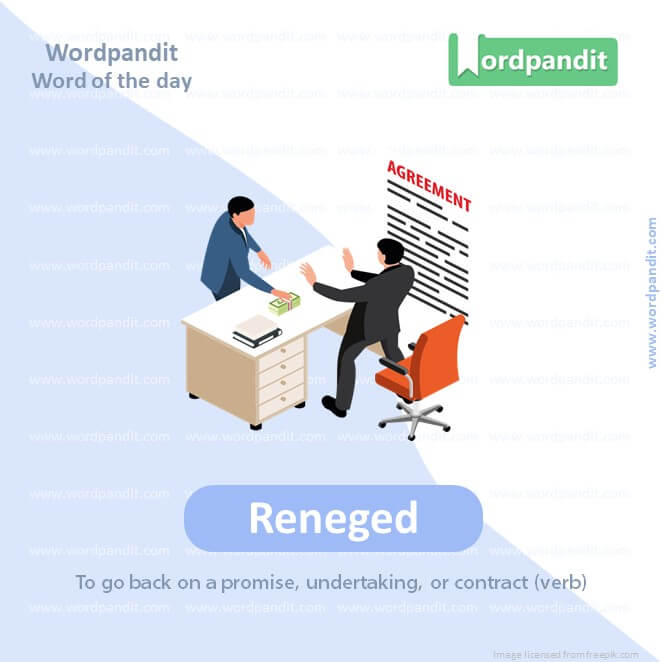
WORD-3: Reneged
CONTEXT: It was perceived as the party that reneged on its promise to extend the Special Category Status (SCS) by another five years.
SOURCE: The Hindu
EXPLANATORY PARAGRAPH: Imagine promising your friend to share your candy but then deciding to keep it all for yourself. When you don’t do what you promised, that’s called “reneging.”
MEANING: To go back on a promise, undertaking, or contract (verb).
PRONUNCIATION: ree-NEGD
SYNONYMS: Backtracked, defaulted, withdrew, retracted, broke
USAGE EXAMPLE:
1. He reneged on his agreement to sell the car.
2. The company reneged on its promise to raise salaries.
3. After committing to the project, she reneged due to personal reasons.
4. The politician was criticized for reneging on his campaign promises.
Of course! Here are the remaining vocabulary words with a gap between the lines for each entry:
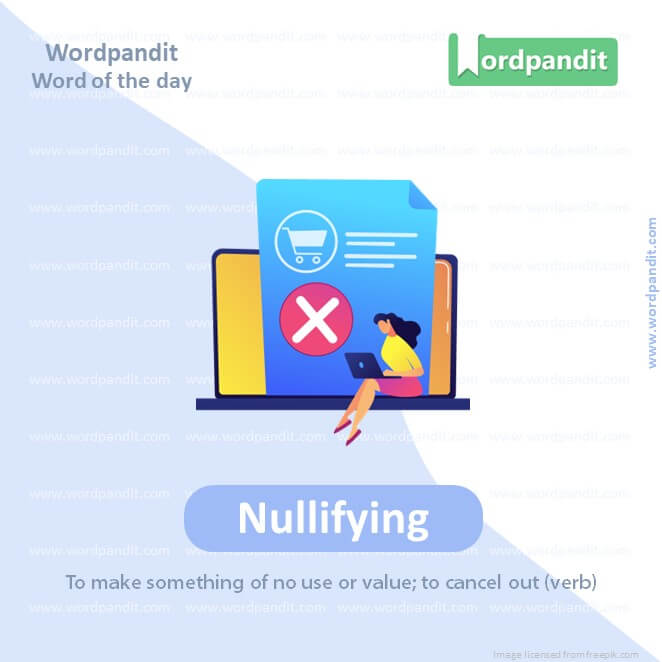
WORD-4: Nullifying
CONTEXT: Vladimir Putin is contesting for a fifth term, also the first time after the 2020 constitutional amendment nullifying his previous terms.
SOURCE: The Hindu
EXPLANATORY PARAGRAPH: Think about drawing a picture and then erasing it completely like it was never there. Nullifying is like erasing; it means to make something not valid or as if it never happened.
MEANING: To make something of no use or value; to cancel out (verb).
PRONUNCIATION: NUL-uh-fye-ing
SYNONYMS: Invalidate, negate, annul, void, abolish
USAGE EXAMPLE:
1. The court’s decision nullified the previous ruling.
2. They sought to nullify the contract due to fraud.
3. The amendment nullified the old law.
4. His late arrival nullified their chance of winning the game.
WORD-5: Interlude
CONTEXT: He was first elected in 2000 and then re-elected in 2004, 2012 and 2018, with a brief interlude from 2008-2012 when he was the Prime Minister, making his trusted man Dmitry Medvedev the President.
SOURCE: The Hindu
EXPLANATORY PARAGRAPH: Think about taking a short break during a long movie to get some popcorn. That break is like an interlude. It’s a short period of time between parts of something, like a pause or rest.
MEANING: A short period of time between two longer periods, often serving as a break (noun).
PRONUNCIATION: IN-ter-loode
SYNONYMS: Interval, break, pause, intermission, hiatus
USAGE EXAMPLE:
1. The interlude between the acts of the play allowed the audience to stretch their legs.
2. A musical interlude was played between the speeches.
3. The vacation was a peaceful interlude in her busy year.
4. The rain provided a brief interlude in the summer heat.
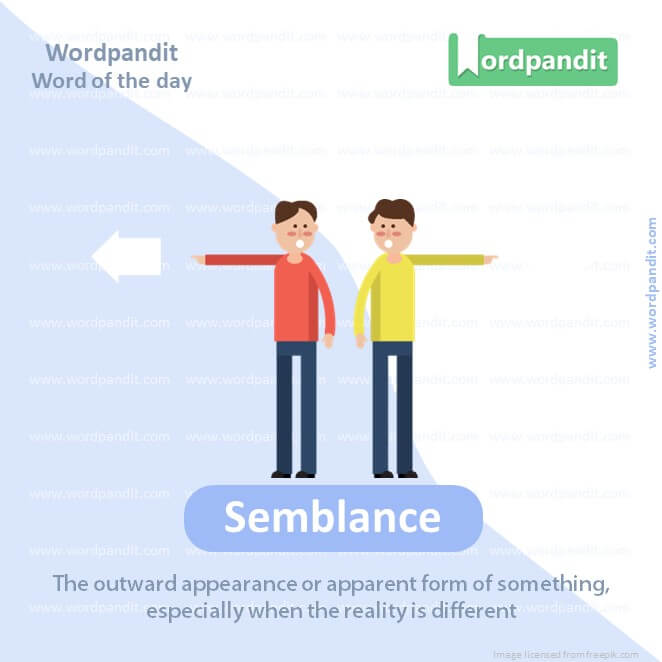
WORD-6: Semblance
CONTEXT: The current election will not offer even a semblance of competition to Mr[.] Putin, much less give a limited stage to any critical opponent as past elections sometimes did.
SOURCE: The Hindu
EXPLANATORY PARAGRAPH: Imagine dressing up like a superhero. You might look like one, but you’re not really a superhero. Semblance means looking like something or having the appearance of it, even if it’s not exactly the same.
MEANING: The outward appearance or apparent form of something,
especially when the reality is different.
PRONUNCIATION: SEM-bluhns
SYNONYMS: Appearance, likeness, facade, pretense, show
USAGE EXAMPLE:
1. He tried to maintain a semblance of normality during the crisis.
2. Despite the chaos, the leader projected a semblance of control.
3. They achieved a semblance of justice with the court’s decision.
4. The ruined building had lost all semblance of its former glory.
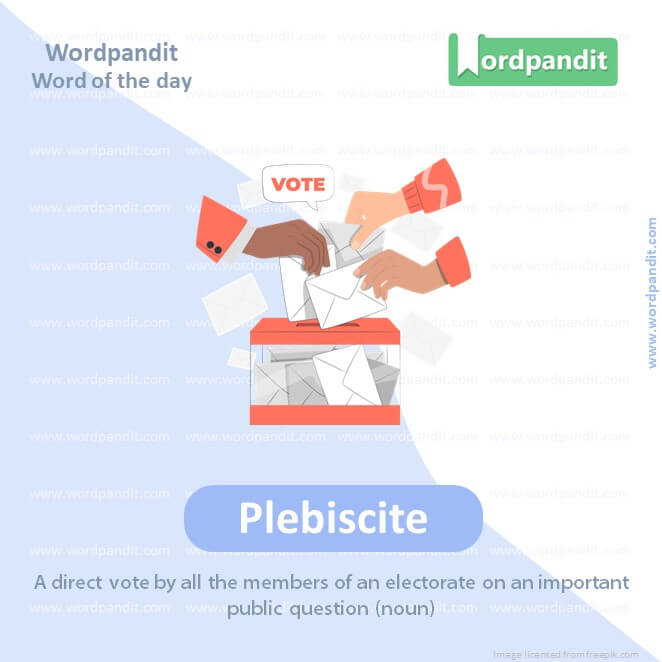
WORD-7: Plebiscite
CONTEXT: It will not be an election, but a plebiscite on the loyalty to Putin,” says Ms. Masha Lipman, a Russian journalist.
SOURCE: The Hindu
EXPLANATORY PARAGRAPH: Think about when your class votes to choose between having pizza or sandwiches for lunch. A plebiscite is like that big vote where all the people in a place decide something important together.
MEANING: A direct vote by all the members of an electorate on an important public question (noun).
PRONUNCIATION: PLEB-uh-site
SYNONYMS: Referendum, vote, ballot, poll, election
USAGE EXAMPLE:
1. The country held a plebiscite to decide on the new constitution.
2. The government announced a plebiscite to determine public opinion on the matter.
3. The plebiscite results showed overwhelming support for independence.
4. A plebiscite was called to resolve the territorial dispute.
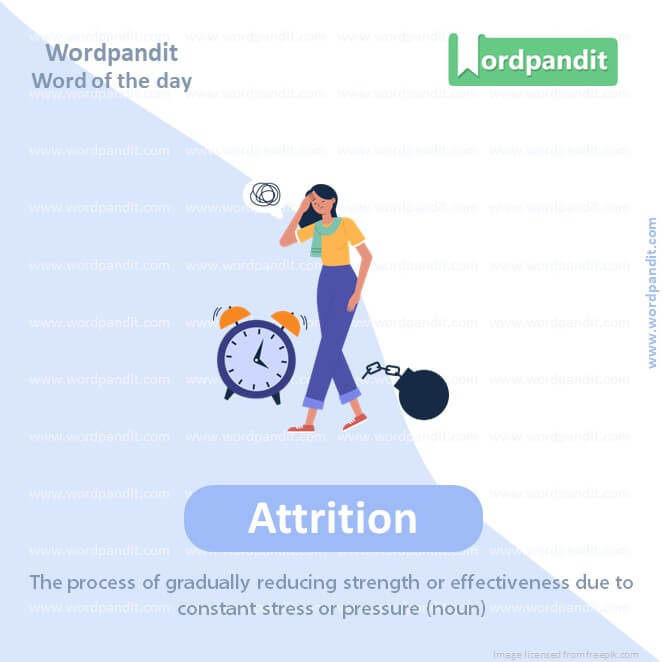
WORD-8: Attrition
CONTEXT: The shot-up demand for military hardware in the face of a war of attrition has spurred the growth of the military-industrial complex.
SOURCE: The Hindu
EXPLANATORY PARAGRAPH: Imagine a pile of candy that slowly gets smaller because you eat one piece every day. Attrition is like that; it’s when things slowly lessen or reduce over time, often because of constant wear or pressure.
MEANING: The process of gradually reducing strength or effectiveness due to constant stress or pressure (noun).
PRONUNCIATION: uh-TRI-shun
SYNONYMS: Erosion, weakening, depletion, reduction, diminution
USAGE EXAMPLE:
1. The company faced employee attrition due to poor management.
2. Attrition in the armed forces was high during the prolonged conflict.
3. The team’s performance suffered due to attrition from injuries.
4. Soil erosion is a form of environmental attrition.
WORD-9: Conservative
CONTEXT: Russia has projected itself as a fortress of liberal-conservative values that trace their origin to the Russian orthodox church.
SOURCE: The Hindu
EXPLANATORY PARAGRAPH: Think about someone who doesn’t like changing how they do things and prefers to keep everything the same, like always wearing the same outfit. Being conservative means liking the traditional way of doing things and not wanting much change.
MEANING: Favoring traditional views and values; tending to oppose change (adjective).
PRONUNCIATION: kuhn-SER-vuh-tiv
SYNONYMS: Traditionalist, conventional, orthodox, cautious, restrained
USAGE EXAMPLE:
1. His conservative approach
to business meant he rarely took risks.
2. The conservative party advocated for maintaining traditional values.
3. She has conservative views on marriage and family.
4. The town is known for its conservative community.
WORD-10 Disintegration
CONTEXT: In a counter to this cultural determinism, Russian authoritarianism is described by some scholars as circumstantial, a result of the unfortunate coincidence of Russia’s Soviet past, democratic opening with institutional disintegration, economic disruption and political uncertainty.
SOURCE: The Hindu
EXPLANATORY PARAGRAPH: Imagine building a sandcastle that slowly crumbles away into nothing. Disintegration is like that; it’s when something falls apart and breaks down into tiny pieces until it’s gone.
MEANING: The process of breaking down into smaller parts or losing strength, making it no longer united or successful (noun).
PRONUNCIATION: dis-IN-tuh-GRAY-shun
SYNONYMS: Decomposition, breakdown, fragmentation, dissolution, decay
USAGE EXAMPLE:
1. The disintegration of the old building was caused by years of neglect.
2. After the leader’s departure, the organization faced disintegration.
3. The empire’s disintegration happened over several decades.
4. Scientists studied the disintegration of radioactive materials.
Vocabulary Difficult Words
In our journey of language learning, an encounter with ‘vocabulary difficult words’ is inevitable. These seemingly intimidating terms can often seem like stumbling blocks. However, they also offer a unique chance to deepen our understanding and competence in the language. With a strategic approach, learning ‘vocabulary difficult words’ can become less daunting and more of an empowering undertaking.
To befriend ‘vocabulary difficult words’, comprehension is key. Familiarize yourself with the meaning, usage, and context of these words. Utilize different resources such as books, documentaries, online articles, and digital content. This contextual exposure can ease the process of understanding ‘vocabulary difficult words’.
Challenging as they may seem, ‘vocabulary difficult words’ can be tamed with appropriate memory tactics. Use of flashcards or digital language learning apps that support active recall and spaced repetition can be effective. To foster deeper connections with ‘vocabulary difficult words’, employ mnemonic techniques. This cognitive strategy, involving association of new information to known concepts or stories, aids in better retention and recall.
Another essential in mastering ‘vocabulary difficult words’ is practice. Be it in conversations, written communications, or social media interactions, endeavor to incorporate these words. Practice not only reinforces your knowledge but also enhances your confidence in using these words.
In conclusion, navigating the terrain of ‘vocabulary difficult words’ involves a confluence of comprehension, memory tactics, and active practice. These strategies, interwoven, help transform intimidating words into familiar friends. By conquering ‘vocabulary difficult words’, you not only augment your vocabulary but also elevate your language skills. Remember, every challenging word unlocked is yet another ornament in your linguistic archive. So, delve deep into the ‘vocabulary difficult words’, and uncover the treasures they hold.










